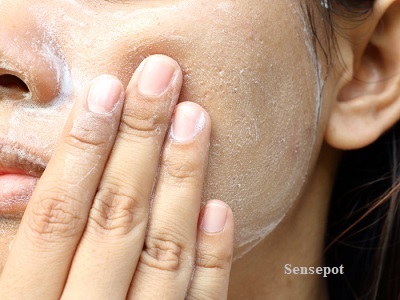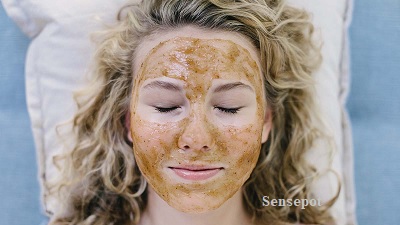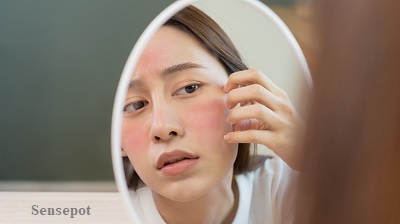Facial care is a beauty ritual consisting of many stages, including exfoliation (peeling). Regular cleansing of the skin from accumulated dead cells is extremely important, as they can clog pores and form flaky areas on the surface of the epidermis. In order not to suffer from such consequences later and not to look for the nearest free window with your beautician, just use exfoliants.

What are Exfoliants?
Exfoliants are cosmetic products or substances, the main action of which is aimed at removing dead skin particles. They can be conditionally divided into several types:
1. Mechanical. These include everyone’s favorite facial scrubs. They often have a gel or cream texture, and also contain natural or synthetic exfoliating particles.
When choosing mechanical peeling, cosmetologists recommend giving preference to products with smaller granules in order to minimize the risk of injury to the epidermis. This is especially important for owners of sensitive and dry skin, which can react with the appearance of irritation.
2. Chemical. This is a deeper method of cleansing dead skin cells. The main active ingredient of these funds is AHA-, BHA- and PHA-acids, retinol, and other active ingredients. Chemical exfoliants are available in the form of serums, masks, tonics, peeling pads, rolls, gels, and more. This type of exfoliant is often used not only to remove the keratinized layer of the epidermis but also to rejuvenate and treat acne, post-acne.
3. Enzymatic (enzymatic). The main component of these peels are enzymes that react with structural lipids in the stratum corneum and dissolve them. Thus, dead cells are exfoliated on their own. It should be borne in mind that exfoliation is carried out only on the upper layer of the epidermis, in contrast to chemical peeling.

Which of these three types of exfoliants is best? It is difficult to answer unambiguously since each of them has its own strengths and weaknesses. The choice will largely depend on the type of skin and your personal preferences.
If you are looking for a peel that will work on the superficial layer of the epidermis, an enzyme scrub or exfoliants will do. With a deeper cleansing of the skin by five plus, a chemical peel will cope.
How exfoliants work
The end result of using any peeling is the removal of the stratum corneum of the epidermis. But as a result of using these funds, we get some more nice bonuses:
- Alignment of complexion, lightening of age spots, post-acne;
- Prevention and Facial Exfoliation treatment of acne;
- Cleansing and narrowing of pores ;
- Smoothing the relief of the skin;
- Facial care cosmetics work more effectively after using peels.
No wonder exfoliation is considered one of the most important stages of skin care.
How to Choose the Right Exfoliant for Your Skin
When planning to supplement your skin care with exfoliants, you probably have already come across a huge selection of products. Each of which promises to make your skin perfect.
In order not to make a mistake with the choice, take into account the type of skin.
Normal skin type
All roads are open to people with a normal skin type – any kind of exfoliant will work equally well. If you have never used such cosmetics before, start your acquaintance with scrubs or enzymes.
Combination skin
People with a combination skin type need to find a middle ground in the selection of funds. It should not overdry the skin, but at the same time, it is necessary to establish seboregulation in the T-zone. You can stop your attention on peelings with AHA acids and enzymes.
Oily and acne-prone skin
The main task of exfoliants for oily and acne-prone skin types is to improve the work of the sebaceous glands and Facial Exfoliation get rid of blackheads. The best solution would be chemical peels based on acids ( salicylic, glycolic ) or retinol.
Visit: B5 Panthenol Cosmetics- Benefits And Uses For Skin And Hair
Sensitive skin
An exfoliator for sensitive skin should be as gentle as possible so as not to cause irritation. Soft AHA- and PHA-acids, and, of course, enzymes, will help to remove dead skin particles carefully.

Dry skin type
Dry skin also requires careful treatment, as any aggressive agent can cause irritation and dry it even more. Suitable chemical peels based on AHA-PHA acids (lactic, malic), as well as enzymes.
Take good care of your skin and include exfoliants in your beauty routine. These products will help to noticeably transform the skin, and will also be useful for solving its problems.
FAQs
1. How often should I clean my skin with exfoliants?
You should clean your skin with exfoliants 1-3 times a week. If your skin is sensitive Facial Exfoliation, it’s better to clean it less often, maybe once a week or every other week, so it doesn’t get irritated.
2. Can exfoliating help with acne?
Yes, exfoliating can help with acne. By cleaning your skin with exfoliants, you can remove the dirt and bacteria that cause acne. However, be careful not to scrub too hard, as it can make your skin worse.
3. Are exfoliants safe for everyone?
Exfoliants are generally safe for most people. However, if you have very sensitive skin or any special skin problems, it’s best to ask a doctor before using exfoliants.
4. Can I clean my skin if it’s dry?
Yes, you can clean your skin even if it’s dry. Just make sure to use a gentle exfoliant and not scrub too much. After cleaning, apply a moisturizer to keep your skin hydrated.
5. Should I clean my skin in the morning or at night?
You can clean your skin either in the morning or at night, depending on what works best for you. Some people like to clean their skin in the evening to remove the dirt from the day, while others prefer doing it in the morning for a fresh start. Try both and see which one you like more.
Write in the comments what types of peeling you use.


